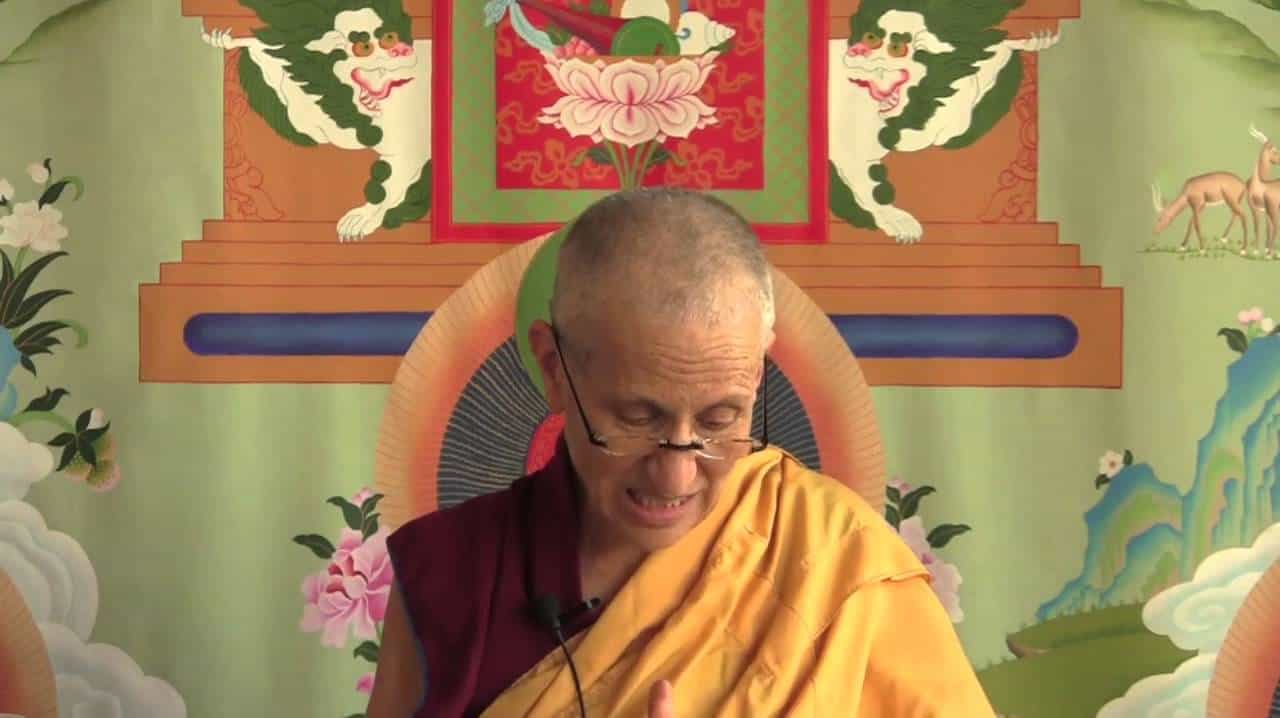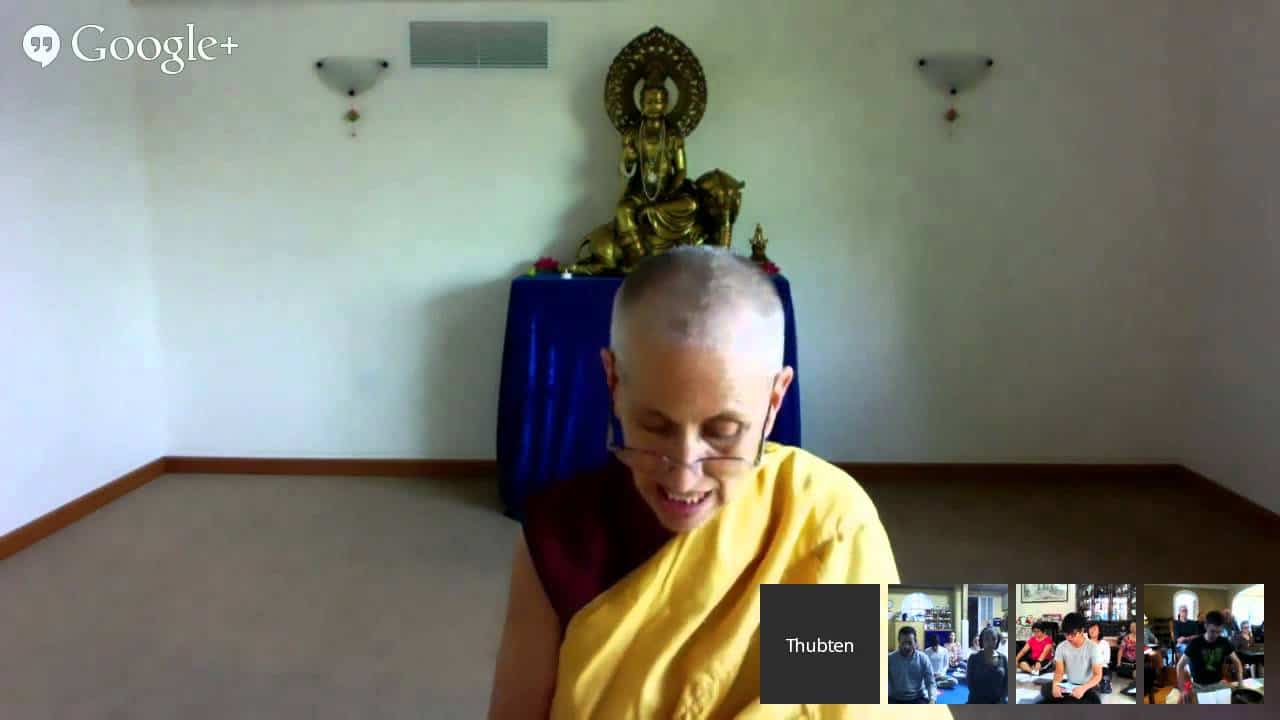Verse 13: Attachment to temporary pleasures
Part of a series of talks on Gems of Wisdom, a poem by the Seventh Dalai Lama.
- Attachment to wealth, fame, and reputation is a source of suffering
- Over-investment in transient affairs only weighs us down in misery
Gems of Wisdom: Verse 13 (download)
Verse 12 review
We’re going to continue with the verse from yesterday:
Who is the drunken fool always bringing suffering onto himself?
The one who spends his time lusting after comfort, pleasure, wealth and fame.
We talked yesterday, especially, about lusting after comfort and how that distracts us and makes us quite miserable. It’s the same with pleasure and wealth. When we have a lot of craving for those things we just run everywhere trying to get all the things we want. And especially in this technological age, there’s no end to the things that we can want. Because they design everything so it’s going to break, and they make it new the next year. And it’s like, wow, my phone is so old, I’ve had it for six months. It doesn’t have all the fancy-shmancy features that I’ll probably never use but never mind, everybody else has this phone. I’d better get it, too.
This produces this constant dissatisfaction and yearning for material possessions, thinking that they indicate our success in life. Which a lot of people believe: The more stuff you have, the more successful you are. Material possessions and wealth sometimes indicate love. You know? If we give things to people, it means we care. So you work many hours, you work overtime, to get a lot of money and a lot of wealth to give to your kids, and meanwhile they feel ignored by their parents. Their parents are always at work.
This kind of lusting for material things really brings big problems.
Then, of course, fame and reputation. We really crave those things and just run after them. And when there’s the slightest hint that maybe somebody doesn’t think as well of us as we would like them to, we get really insecure, we get really jittery. You know? It’s like, “Oh, maybe somebody misunderstood that joke, or they misunderstood that small comment I made…. So I’d better write them ten emails now, clarifying what I really meant. so that they don’t misunderstand me and think badly of me….” You know how it is? So always kind of insecure and, “What are they going to think about me?” And always explaining ourselves ad nauseam about tiny things that the other person doesn’t even remember, but we feel we have to clarify so they don’t get the bad impression of us. So that brings a lot of problems.
Now, I’m not saying don’t clarify things when people misunderstand, because if people misunderstand it’s good to explain things if the misunderstanding is causing them some kind of agony or angst or sorrow or something like that. But when our motivation is simply our own reputation. “I don’t want them to think badly of me!” Then we really have to look at is all of that necessary or are we just again and again thinking that all people have to do is think about us, so we’d better explain ourselves again and again so they understand us exactly as we want them to understand us.
Are you getting what I mean? I don’t want you to misunderstand this. Maybe I’d better explain again. [laughter]
Verse 13
Shall we go on to verse 13?
What is the weight that brings down the painful bubble of misery?
Any clinging one has to superficial transient affairs.
I think of it more as you might have a bubble that looks kind of nice. But when you have a weight, it’s going to crash that bubble, isn’t it? And make that bubble turn into something very miserable. So what causes that? “Any clinging one has to superficial transient affairs.” Because from a Dharma perspective, whenever we get distracted with superficial transient affairs, things that don’t really matter in the long run, you know. Like caring about our reputation. “Do they like me? Do they not like me? Do they think I’m good? Do they think I’m bad?” All that kind of stuff. That’s really transient, isn’t it?
“Yes, it’s transient but it’s extremely important! What somebody thinks of me is very important.”
They’re just some other deluded beings. Why is what other deluded beings think about us important? What the Buddha thinks about us is important. If we’re criticized by the people who are wise, then we need to wake up. But we usually don’t worry so much about what wise people think about us. Because we usually brush them off. We care about what the deluded people think about us because we want them to like us. And we want to be popular. And we want to be seen as successful and attractive, and this and that and the other thing. So that is an example of clinging to superficial transient affairs.
The point is that a lot of what we think is important is actually a superficial transient affair. Like, “Did I get invited to the party? No. They invited other people, they didn’t invite me. Why didn’t they invite me? Oh because somebody else must have said something bad about me. Who was that? Oh, I know, this person must have told that person this kind of thing about me, and that’s why I wasn’t invited to the party. And if I’m not invited to the party…. Oh no….. What are they going to think of me?”
Then of course you get invited to the party and it’s, “What am I going to wear to the party? Because I need to attract other people.” So it doesn’t matter, male, female. “What am I going to wear? How am I going to look? Because I want to look good so I can be attractive to who knows who is going to be at the party.” And so you spend hours in the bathroom.
I visited my sister and her family recently. My nephew is a great kid, and he spends like an hour in the bathroom. More time than his sister. So I share the same bathroom, and there’s a mirror—the kind that magnifies everything—so you look at every small thing in your face. As if that’s going to be the reason that people like you or don’t like you.
We just get really bent out of shape about things that are really not that important, so we waste a lot of time that way, our whole life goes by. And meanwhile, no Dharma practice gets done. We don’t transform our mind at all. We don’t purify our negative karma. We don’t make offerings and do Dharma practices because we’re too busy being consumed with transient affairs.
Like, “Who’s going to get the promotion?”
Oh, we don’t think that’s a superficial transient affair. Again, that is very serious business.
Or, “Who closes the deal?” Or, “Whose article gets published on the front page of the newspaper?” Or whatever it is. These things that the rest of the world really couldn’t care about. But we think are just so weighty and important, so they consume our time, they consume our energy. We wind up generating so much clinging and attachment and anger and jealousy over them. And as a result our precious human life just goes by without our giving any deep meaning to it. And that’s the real tragedy, when that happens.
Venerable Thubten Chodron
Venerable Chodron emphasizes the practical application of Buddha’s teachings in our daily lives and is especially skilled at explaining them in ways easily understood and practiced by Westerners. She is well known for her warm, humorous, and lucid teachings. She was ordained as a Buddhist nun in 1977 by Kyabje Ling Rinpoche in Dharamsala, India, and in 1986 she received bhikshuni (full) ordination in Taiwan. Read her full bio.


